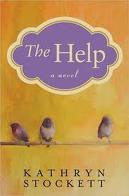This month's book, The Help by Kathryn Stockett, was another home run read for our group. Recommended by one of our members (thank you Renee!), everyone was excited to read it as we had all heard very positive things about it. But I am not sure that we all expected the book to have the impact on us that it did. Not because we are not familiar with life in the South or because we haven't lived, read, or watched all about it, but because this book really hit your heart as a mother, daughter, singleton, and as anyone in any sort of women's only club!
As the title elude's, the book is about the help that white people in the 1960s would hire to help clean the home, cook dinner, and raise their children. This last part had a significant impact as it was very eye-opening to say the least. To learn how Abileen and all of the other maids had such a significant role in raising the children that these children were closer to them than their own mother was something. And specifically Abileen's role with Mae Mobley, well, that just about broke your heart every time it came up in the book. When Abileen would tell Mae Mobley that "you kind, you smart, you important" because her own mama would never tell or teach her these things, I think we all stopped and thought Am I doing that?
The book is great as it explores both sides, if you will, of the story. I think there is one quote that sums up the perspective that white women and men had from that era, and it is from Miss Skeeter -
“They say it’s like true love, good help. You only get one in a lifetime.”
This is being rather positive, as there are obviously some very racist view points described throughout the book, and even in real life, but I think this best explains the point of The Help. Now the quote that I believe sums up the perspective from the black women and men from that era is when Abileen addresses Mae Mobley’s question about why she is colored,
“Cause God made me colored...And there ain’t another reason in the world.”
Need we say more...
Some additional memorable quotes that our group enjoyed were:
Ch 3 Miss Celia, "I want him to think I'm...worth the trouble."
Ch 19 Callie (a maid being interviewed), "If any white lady reads my story, that's what I want them to know. Saying thank you, when you really mean it, when you remember what someone done for you...it's so good."
Ch 24 Abileen "All I'm saying is, kindness don't have no boundaries."
Ch 27 Skeeter "I always thought insanity would be a dark, bitter feeling, but it is drenching and delicious if you really roll around in it."
Ch 27 Skeeter "Everyone's asleep in this town in every way possible."
Ch 33 Skeeter "Wasn't that the point of the book? For women to realize, We are just two people. Not that much separates us. Not nearly as much as I'd thought."
As you know by now, our group has a way of finding the funniest quotes and putting them to good use. Here are some of those, and yes, for some reason the word 'shit' seems to be in most of them!
Ch 6 Mister Golden describing Miss Myrna to Skeeter - "Miss Myrna's gone shit-house crazy on us."
And this has a "shit-house crazy" story to go along with it. Our beloved CC ran across this quote first and sent it to me to tell me a story about it. Low and behold she sent it to the wrong person! Another Jennifer Pratt. Who knew that was even possible. I hope that she has as good of a sense of humor and loves books as much as this Jennifer Pratt!!
Ch 13 Miss Skeeter when referring to her date with Stuart - "shit-dog drunk"
No worries, we weren't "shit-dog drunk" while discussing this book!
Ch 24 Minnie describing Miss Celia "...a juke joint hussy"
I am sure we all know a few of these lovely ladies...
So please read this book if you have not already. It is eye-opening, inspiring, and down right hilarious!

